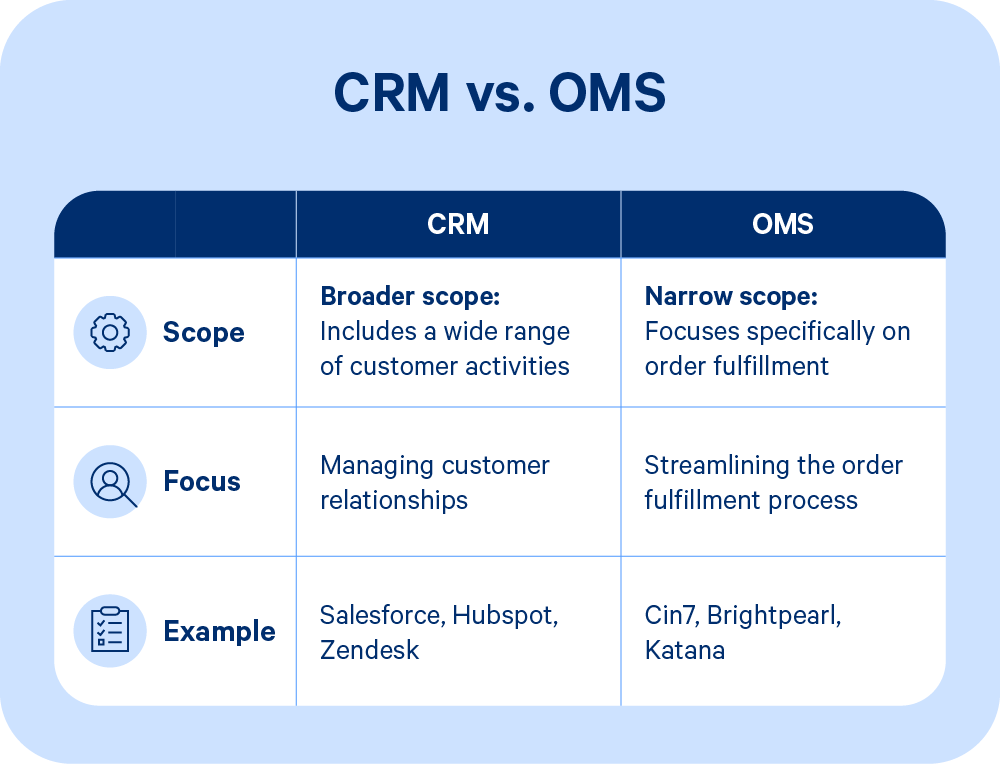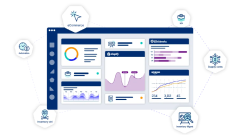
Fulfilling a customer’s order is more complex than picking and shipping products off the shelf. The process starts long before that. Businesses must consider getting the parts or inventory into their warehouse, sorting everything out, and tracking inventory to ensure they’re well-stocked. They also need to ensure that their shipping schedules operate at a sufficient pace to get products to customers quickly.
Order management software is a powerful tool businesses use to streamline and automate their order fulfillment processes. It enables efficient order management from initiation to final delivery. This software centralizes and organizes all order-related information, customer details, product inventory, and shipping information. By integrating with various systems, such as e-commerce platforms and inventory management software, order management software provides real-time visibility into order statuses, inventory levels, shipping updates, and more.
Order management software additionally provides industry-specific benefits to business owners in different sectors. Some include:
- Retailers: OMS allows retailers to manage, track, and fulfill orders from many different sources, like brick-and-mortar stores, online marketplaces, and other e-commerce platforms.
- Manufacturers: OMS allows manufacturers real-time visibility into orders and inventory levels.
- Wholesalers: OMS lets wholesalers easily track available stock, monitor replenishment needs, and avoid stockouts or overstocks.
- E-commerce businesses: OMS empowers e-commerce businesses to centralize all order-related information, allowing companies to manage orders from multiple sales channels in one place.
While an order management system will benefit your business, some solutions make more sense than others, and some come with advanced features that make your day-to-day operations easier. Here are the 11 best order management software options, details on who they’re best suited for, their prices, and key features.
Methodology: To compile our list, we weighed software that serves different markets, the features of each, their prices, and their user reviews.

Best order management software solutions in 2023:
- Cin7
- Brightpearl
- IBM Sterling
- QuickBooks® Enterprise
- monday.com
- Zoho Inventory
- Veeqo
- SAP Commerce Cloud
- Salesforce Commerce Cloud
- Katana
- Sana Commerce
- Benefits o an order management system
- What is the difference between CRM and OMS
- How to select an OMS
1. Cin7
At Cin7, we set ourselves apart from competitors by offering two strong products with robust order management capabilities. Cin7 Core, our comprehensive small business solution, automates tasks like data entry and reordering, so you can spend more time running your business. The software also works as a strong point of sale (POS) solution, allowing you to easily track your sales, find new customers, and manage sales from anywhere.
Cin7 Omni, our tool with native EDI & 3PL integrations, elevates order management for small and midsize businesses by connecting products, sales, orders, warehouses, and more in one centralized and automated solution. With your orders living in the same place as the rest of your business data, you can focus more on creating value for your business rather than digging through spreadsheets.
We believe in our tools and their ability to help customers achieve their business goals. See what Software Advice and Forbes say about our software.
Best for: Small and midsize businesses looking to move their order management process from spreadsheets to a centralized platform
Pricing:
- Core
- Plans start at $325/month
- Omni
- Contact us for pricing options
Key features: Automated inventory replenishment, e-commerce order downloads, 3PL pick requests, automated purchase orders, Amazon order management
2. Brightpearl
Brightpearl allows businesses to manage order fulfillment with ease so more resources can go into business development. With various fulfillment options ranging from dropshipping to multi-location fulfillment, Brightpearl can be an effective option for various product sellers.
With multi-channel integration, Brightpearl makes it easy for product sellers to integrate with their preferred sales channel. But while Brightpearl can help product sellers reach more customers in different markets, it falls short in providing insights into sales numbers.
Best for: E-commerce brands looking for a scalable order management solution
Pricing: Available upon request
Key features: Plug-and-play e-commerce integrations, automatic sales channel updates, automated stock replenishment
3. IBM Sterling
Designed to give large organizations the ability to centralize order management across platforms, IBM Sterling is a strong choice for companies looking for a tool that can simplify more complex product order management processes.
Described by IBM as a “single source of truth” for companies that use various sales channels, IBM Sterling works to centralize order information, allowing enterprise companies to manage all their orders in one place.
Best for: Large companies looking to simplify complex product order management processes
Pricing: Available upon request
Key features: Automated sourcing decisions, multi-location inventory management, enables transfers in the event of a stockout, uses aggregated inventory information for order fulfillment
4. QuickBooks® Enterprise
QuickBooks offers a comprehensive order management feature within their Enterprise tool that allows businesses to manage order fulfillment within one system — simplifying order entry, invoicing, payments, and more.
While the tool is an excellent way for businesses to streamline inventory and order management, advanced inventory management features are locked to Gold users and only available to Platinum and Diamond users — making it a little more costly for growing businesses to access the full order management capabilities.
Best for: Product-based businesses looking for a scalable order management system
Pricing:
- Gold: $1,830/year
- Platinum: $2,250/year
- Diamond: $4,400/year
Key features: Simplified order entry, centralized order management dashboard, automated invoicing
5. monday.com
For businesses looking to easily track incoming orders and gain complete visibility into the order cycle, monday.com is a compelling choice. A comprehensive work and project management tool, monday.com offers several templates and tools that can help product sellers streamline the order process.
While monday.com offers many integrations that are prime for project management, it falls short in providing all the integrations to sales channels that product sellers may be interested in, making it difficult to reach new customers.
Best for: Small businesses looking for more management and visibility into the order cycle
Pricing:
- Free version (up to 2 seats)
- Basic: $8 per seat/month
- Standard: $10 per seat/month
- Pro: $16 per seat/month
- Enterprise: Available upon request
Key features: Order tracking dashboards, automated order updates, email integration, custom order templates
6. Zoho Inventory
Zoho Inventory is another good option for multi-channel product sellers, as it integrates with Amazon, Shopify, eBay, and Etsy to centralize product and order information.
With Zoho Inventory, you can also automatically print packing slips, generate shipping rates, and track shipments through the order process. Zoho additionally gives you insight into your most and least profitable items — so you can make data-driven decisions about which items to prioritize.
Best for: Solo entrepreneurs or small businesses looking to streamline their order process
Pricing:
- Free version
- Standard: $59 per organization/month
- Professional: $99 per organization/month
- Premium: $159 per organization/month
- Elite: $239 per organization /month
- Ultimate: $329 per organization/month
Key features: Sales channel integrations, package slip creation, payment integration
7. Veeqo
Veeqo’s appeal comes mainly from it being a free tool, but it’s still a strong option for solo product sellers or businesses that are just getting off the ground.
Allowing you to print branded shipping labels and create custom invoices, Veeqo can help you create a name for your business — at no cost. Its reporting features can also give you insight into popular products, order history, and accounting.
Best for: Individual product sellers or young businesses looking to speed up the order process.
Price: Free
Key features: Bulk shipping label printing, branded custom invoices, sales reports, internal shipping notes, ability to reroute lost packages
8. SAP Commerce Cloud
SAP Commerce Cloud has a built-in order management feature that can benefit retailers and wholesalers looking for more visibility into stock and order tracking.
Built within the SAP Commerce Cloud’s order management feature is the Backoffice Order Fulfillment Cockpit, a dashboard that allows users to manage customer orders, review package information, and manage warehouses — providing a centralized view of all your order information.
Best for: Enterprise companies with complex product order management
Price: Available upon request
Key features: Automated order workflow, sourcing, order splitting, ability to view fraud reports, ability to pick, pack, and label shipments
9. Salesforce Commerce Cloud
The Salesforce Commerce Cloud includes an order management feature to centralize omnichannel sales in a single platform. The top CRM in the world, Salesforce’s inclusion of an order management tool makes it convenient for existing customers to handle all their resources in one place.
The main advantage of Salesforce order management is its ease of integration with its other products. If you use Salesforce for different business needs, like B2C Commerce or B2B commerce, your OMS will easily fit in with your other tools.
Best for: Existing Salesforce customers looking to streamline omnichannel order management
Price: Available on request
Key features: Order servicing, distributed order management, omnichannel inventory, automated order rerouting
10. Katana
Katana’s order management system simplifies order management for manufacturers — allowing them to automate manufacturing cost calculations using bill of materials data and gain complete visibility to the shop floor through a mobile app.
Additionally, the insights from Katana’s order management tool allow manufacturers to view all available raw materials and make sales and production decisions based on what is and isn’t available.
Best for: Manufacturers and e-commerce businesses looking for a centralized order management solution
Price:
- Essential: $99/month
- Advanced: $299/month
- Professional: $599/month ($799/month after the first year)
- Enterprise: Available upon request
Key features: Real-time data management systems, automated manufacturing cost calculations, shop floor visibility through a mobile app
11. Sana Commerce
Sana Commerce helps product sellers elevate their online stores by automatically creating custom product pages based on the products in your ERP and PIM system.
From there, the software uses its native ERP integration to ensure all changes made to product pages get reflected in your online store — allowing you to focus on driving sales rather than keeping tabs on your online marketplace.
Best for: Product sellers looking for streamlined order management and an elevated online store
Price: Available on request
Key features: Automatic language translation, automated returns, automated order editing, order tracking
Benefits of an Order Management System
An order management system (OMS) benefits more than just your internal team—it improves the experience for customers and vendors, too. If you’ve ever ordered something online only to find it was out of stock or showed up with no order tracking, you’ve seen firsthand why OMS matters.
Here’s what the right OMS can offer:
Better Customer Experience
Customers expect transparency—from estimated delivery dates to real-time tracking. An OMS gives your team full visibility into order statuses, helping you deliver accurate updates, reduce errors, and build customer trust.
Stronger Vendor Relationships
By streamlining communication and providing real-time insights into order statuses and vendor managed inventory (VMI), OMS helps you stay aligned with suppliers and prevent bottlenecks in the supply chain.
Smarter Inventory Reordering
With automated low-stock alerts and customizable reorder points, an OMS keeps your inventory levels optimized, reducing carrying costs, overstocking, and manual errors.
Insightful Reporting
Advanced reporting tools provide visibility into order volume, product performance, and fulfillment speed. These insights help you spot trends, optimize operations, and plan with confidence.
What is the difference between CRM and OMS?

Customer relationship management (CRM) and order management software (OMS) serve different functions. While a CRM focuses on managing customer relationships, an OMS prioritizes optimizing the order fulfillment process.
While OMS focuses on addressing the order fulfillment process and logistics, CRM is broader in scope and encompasses a more comprehensive range of customer-centric activities. Some solutions, like Cin7 Core, include both order management and basic CRM functionality –– including tracking leads and opportunities.
How to Choose the Right Order Management System
While every industry has its quirks, there are a few must-haves to look for in any order management system:
- Prioritize Scalability: Your OMS should grow with you—handling more orders, more inventory, and new sales channels as your business expands.
- Ensure Key Integrations: Make sure the platform connects with all your existing tools and sales channels. The smoother the integrations, the more efficient your operations.
- Look for Industry-Specific Features: Whether you need batch tracking for perishables or B2B workflows for wholesale, choose a solution built with your business model in mind.
What Software is Used for Order Management?
Finding an order management system is just one part of running your business effectively. One of the reasons these systems work so well is that they grant the ability to consolidate all your information in one place.
The best order management systems should free you from monotonous data entry and worry that products aren’t reaching customers and let you instead focus on adding value to your business. With a centralized solution like Cin7 Core or Cin7 Omni, you can streamline your processes and make sure you never miss a beat.
Ready to ditch spreadsheets and track orders more efficiently? Start your free trial of Cin7 Core to see what automated order management can do for you.
More from the blog
View All Posts
10 best software solutions for small business management in 2024
Read More
The 12 best NetSuite alternatives to enhance business operations
Read More



